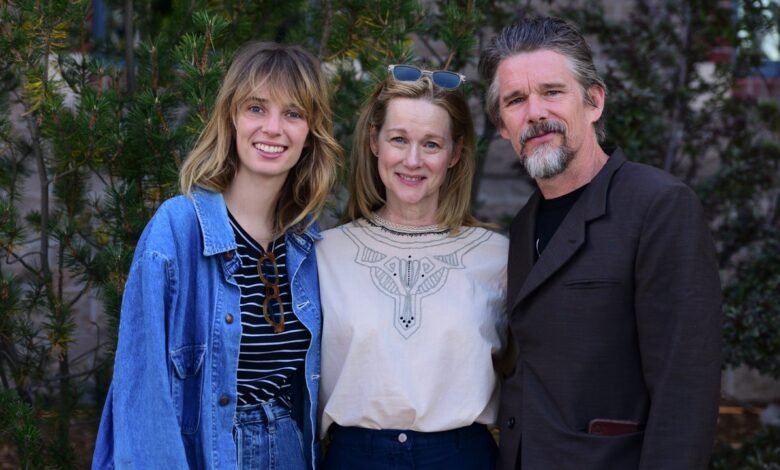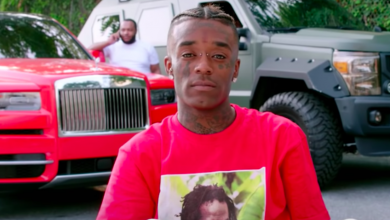How Ethan and Maya Hawke Decided to Make Wildcat Together

“Yes, I’m a nepo father,” Ethan Hawke cracked at the world premiere of Wildcat in Telluride, bright and early on Friday morning. The Oscar- and Tony-nominee wanted to get the obvious out of the way: Perhaps his most cinematically ambitious film as a director was starring his daughter, Maya Hawke, in by far the biggest role in her career. Wildcat marked the result of years of talking about Flannery O’Connor between the two, going back to Maya’s audition for Juilliard. (She prepared a monologue out of O’Connor’s famous letters, and was accepted.) So the crowd laughed at the joke, then settled in for a rich, layered, elliptical take on the iconic and now-controversial author—one that turned out to be more of a family affair than even the dual Hawke credits could’ve revealed alone.
Credit Laura Linney for that. Linney has known Ethan Hawke for decades; they starred together in the latter’s Broadway debut, The Seagull, in 1992, and have been close friends and occasional collaborators ever since. Ethan’s decision to cast her as Flannery’s—and Maya’s—mother holds intense significance, as does his narrative focus on the complex and tight bond between the two women. The film argues that a great deal of O’Connor’s radical, groundbreaking qualities as a writer are rooted in her upbringing in Georgia, both her connection to the South and her frustration at some of its stifling attitudes. A sense of memoir between the Hawkes and Linney seeps into the material. They each brought their ideas, sensibilities, and particular talents to the film, culminating in a singular collaboration.
That’s most evident when I meet the trio at a nearby café, sitting under the Colorado clouds at an outside table. There’s joy and curiosity and maybe a bit of anticipation for the first reactions to the smart, tricky Wildcat—which interweaves O’Connor’s biography with reenactments of her short stories, with Hawke, Linney, and other actors stepping into multiple roles. We get into a deep, often funny chat about what these three artists mean to each other, and how they brought all that to this film. (Wildcat is currently seeking U.S. distribution and has secured a SAG-AFTRA interim agreement, meaning the striking guild has permitted its stars to promote the film.)
Vanity Fair: Maya, you brought this idea to Ethan, to write and direct a film about Flannery O’Connor. What was your discovery process with O’Connor’s work, and what made you think of your dad as the filmmaker for this?
Maya Hawke: I went to a wonderful high school that had teachers who got to choose their own curriculum, and I had a wonderful teacher named Ben Runner who assigned Flannery to me. I really liked him and wanted to impress him, so I went and found A Prayer Journal so that I could be like, “Not only did I read the recommended reading, but I did find this other book and I thought I’d talk about it.” It started there. I really connected to her desire and ambition and her self-doubt and her fear and the way that those things interacted with her desire to work…. And it felt connected to my dad. He’s always talked about his relationship with his own religion and coming from, in some ways, a religious Southern background.
Ethan Hawke: The more you say that, the happier your grandparents will be.
Maya: He’d been showing me Thomas Merton and Emerson all of these different things my whole life, these different ways of looking at and examining one’s relationship to God. It was fun for me to be like, “Oh, I have this thing, A Prayer Journal, and we can add it to that conversation about Merton and Emerson and keep talking.” You know, because every girl wants to impress her father with esoteric religious southern gothic American writers. [Laughs]
Ethan: It worked on me.
Clearly. So she brings all this passion to you. What was your reaction to her pitch, and how did you envision the movie?
Ethan: Even as you hear her talk right now—it’s like, I come at directing as an actor. That’s how I learned about directing is by being directed by bad directors, okay directors, great directors.. And one of the things that really good directors do is they follow an actor’s passion. If Kevin Kline comes to you and says, “I want to play Falstaff badly. And you’re a theater director. I got a good idea for you. Why don’t you direct Henry IV?” That’s going to go well for you. When an actor has a passion and a fire, that’s a great place to start, and this actor happens to know me really well and know what I’m interested in. I absorbed what she said, and I started seeing the possibility of making a movie about imagination and the nature of, “What is the intersection between human creativity and faith and imagination and reality?” Some strange equation using Flannery O’Connor as a launchpad for that exploration. And she thought that was a good idea.
And then I called Laura and I explained that to her, and Laura said, “I think that’s a good idea too. Let’s try to do that.” The wheels start turning and everybody starts working: “Well, not this, not that. No, not like that. Oh, I don’t like biopics.” This thing evolves and turns into something you screen at 9:00 AM at Telluride on top of a mountain.




